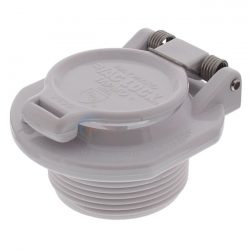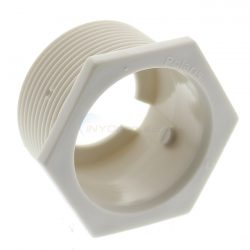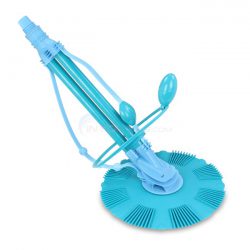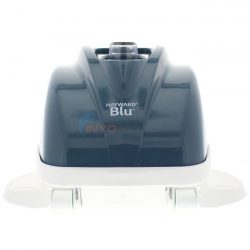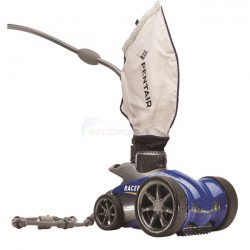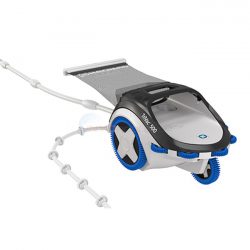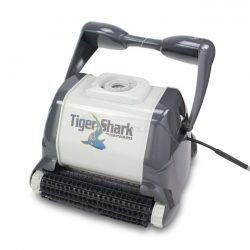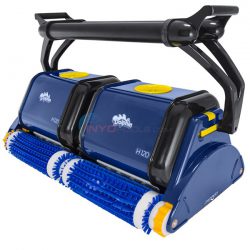You are confused as to which pool cleaner you should get for your swimming pool. Perhaps you are a new homeowner? Not sure what may or may not affect a cleaner’s functionality? Time for an upgrade and don’t quite understand which cleaner best suits your pool needs, is there a pre-existing system set up, and you are just not sure where to begin? Let’s go over a few qualifying questions and things to consider when selecting your pool cleaner which should make the maintenance of your swimming pool easier for you, and your family.
Which Pool Cleaner Do You Have?
First, let’s confirm what exactly you have going on at your pool system. Do you have a designated suction or pressure cleaner line? These lines are most often located around the center area of the pool on the longer wall. It is a 1.5- inch line that has female threads and just might already have a vac lock, or a universal wall fitting on it. Here are pictures of both so you know what they look like.
If you have one of these lines, you can use a suction or a pressure pool cleaner. Now, if you do not have a designated line for either (i.e. a suction, or pressure pool cleaner), you can always use your regular skimmer for the suction needed to operate a suction cleaner. A suction cleaner will use your regular pool pump for the suction needed and the pressure uses water pressure from the regular pool pump water return or a separate booster pump for water pressure.
Always keep in mind that with either a suction or pressure pool cleaner, its ability to climb walls and clean a tile line ultimately depends on the pool finish application, and how well the system is working. We recommend to still brush all the walls, steps, swim outs and tile lines manually every week regardless of what style of cleaner you have.
How Dirty Does Your Pool Get?
Now, some swimming pools attract different levels of dirt or debris which may change the recommendation for a cleaner. For example, if your swimming pool gets larger debris, you may want to consider going with a suction cleaner that uses a diaphragm or flapper. These cleaners have slightly less of an issue grabbing larger leaves or debris than some of the other suction- style pool cleaners.
Suction Cleaners
If your swimming pool really does not get too much large debris, but mainly gets dirt or sand sediments in it, then getting a suction cleaner with more of a cleaning program that has more moving parts may be a better route to go. A suction cleaner uses the main pool pump and sucks in/vacuums dirt and debris. These suction- type cleaners are also quieter than the diaphragm/flapper styles, and usually, have more moving parts to replace. So, keep that in mind when considering these types of suction cleaners. Suction cleaners generally range in price from low to- moderate.
Pressure Cleaners
Now, pressure cleaners usually use a separate booster pump but do not always require one. Some models use the main pool pump and return jet to provide the water pressure needed to operate the cleaner. The lines for these types of cleaners are most commonly ¾ inch but can go up to 1.5 inches as well. Pressure cleaners also use more of a program to move across the swimming pool and typically have more moving parts that may need to be replaced. The pressure cleaners that use a booster pump have great water pressure and have fewer issues grabbing larger debris than suction cleaners. Some of them also have a tail that aids in keeping the fine sediment in suspense in the water helping the filter to grab them. Some may have an option to use a fine silt/sandbag as well. Typically, pressure cleaner prices range from moderate to- high.
Robotic Cleaners
Lastly, you have robotic cleaners. These are the cleaners with the most features and intelligence. They can climb steps, scrub tile lines, and remember your pool design. There are models that you can control by remote/Bluetooth, and have their own pump and filter mini system. These cleaners rely solely on electricity. These cleaners can also pick up a fair amount of large and small/fine debris through either a cartridge or even filter bags. They also may also have many moving parts that might need replacement in the future. Commercial pools have their own models as well. These are the elite automatic swimming pool cleaners and are the highest priced automatic pool cleaners on the market.
To summarise, I would say there are at least three main questions to ask yourself when selecting an automatic pool cleaner for your swimming pool.
1. What type of pool cleaner system do you currently have, if any?
2. How does your surrounding environment affect your swimming pool?
3. What are your current and future budget for repairs?
If you have any other questions about pool and spa products please do let us know - we are here to help!


